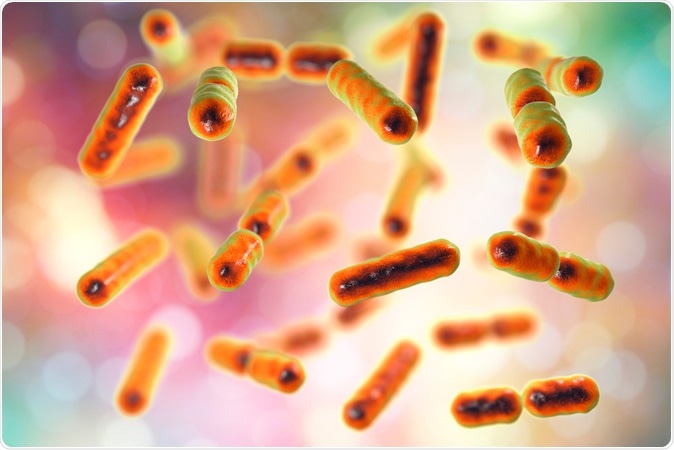The human gut contains trillions of bacteria that form the gut microbiome or microbiota. A new research has linked the composition of this gut microbiome and depressive disorder. The study titled, “The neuroactive potential of the human gut microbiota in quality of life and depression,” was published in the latest issue of the journal Nature Microbiology this week.

Gut microbes Coprococcus and Dialister are markedly lower among those suffering from depression, 3D illustration. Image Credit: Kateryna Kon
The study led by M. Valles-Colomer used DNA sequencing to look at the composition of microbes in the gut. They analyzed the gut microbiota of over 1,000 people from their feces samples. The participants were part of the Belgium’s Flemish Gut Flora Project. The team then connected the microbiome composition of the participants with the quality of life and other factors in the participants. They used self reported and physician supplied diagnosis of depression among the participants and associated it with the gut microbial picture. The data was then validated from another cohort of 1,063 participants of the Netherlands’ LifeLines DEEP project. The final results from all the data collected was used to connect the microbiome of the gut and the functions of the central nervous system.
Lead researcher Jeroen Raes, from the department of Microbiology and Immunology at Flanders Institute for Biotechnology and the Catholic University of Leuven said, “The notion that microbial metabolites can interact with our brain -- and thus behaviour and feelings -- is intriguing... Until now, most of the studies were or in mice or in small-scale human studies, with mixed and contradictory results.”
Results revealed that presence of two groups of bacteria, Coprococcus and Dialister were markedly lower among those suffering from depression. Both these groups of bacteria have anti-inflammatory properties. Raes said, “We also know that neuro-inflammation is important in depression. So, our hypothesis is that somehow these two are linked.”
They noted that the gut microbiome indeed played a role in breaking down the metabolic product of the neurotransmitter Dopamine. This product is called 3,4-dihydroxyphenylacetic acid. This is one of the strongest evidence that connect gut microbiome and human brain function says the researchers. Although they agree that only a correlation has been found and not a cause and effect relationship. More research is needed to come to conclusions they add.
According to the World Health Organization (WHO) there are 300 million people diagnosed with depressive illness across the globe. If a connection between gut microbiome and depression could be established, new avenues of therapy and management could open up believe experts. Raes said, “This paves the way for treatments in depression. One option is novel, next-generation probiotics. I really think there is a future in this: using cocktails of human-derived bacteria as treatment? - bugs as drugs, as they say.”